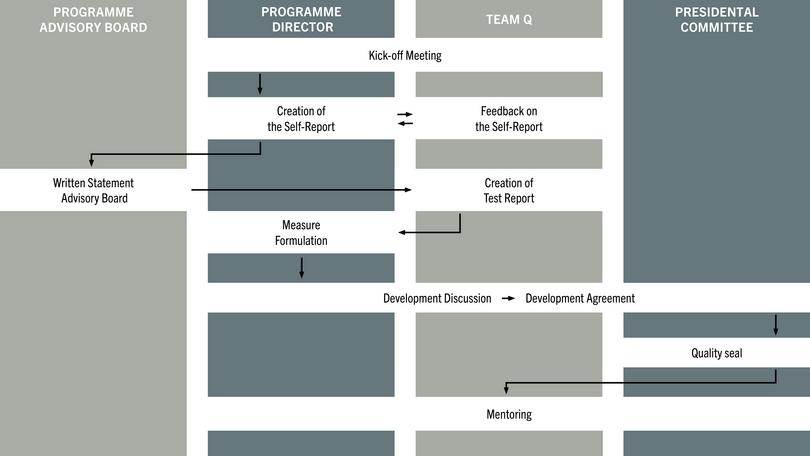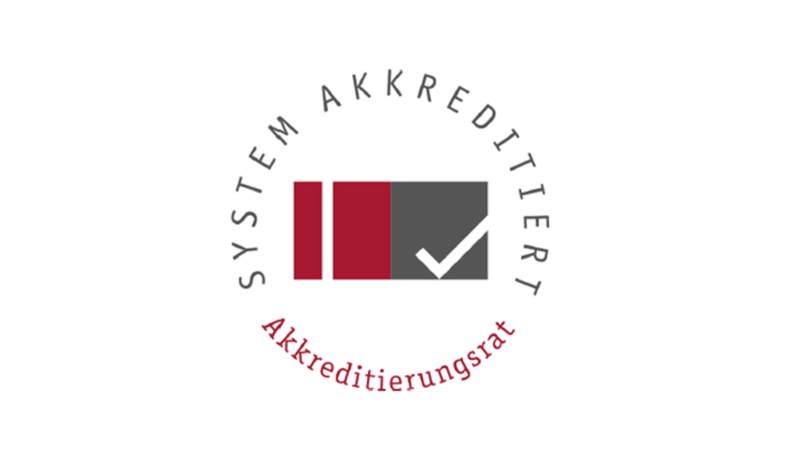Internal audit
Leuphana's quality management supports the continuous development of studies and teaching and creates a binding framework within which quality development can unfold. As a system-accredited university, Leuphana ensures and develops the quality of its study programs under its own responsibility.
Internal review procedures have replaced external program accreditation at Leuphana since 2014.
Study programs undergo an internal review process when they are newly established and generally every eight years.
The central element here is the so-called Program Advisory Board, whose members - external experts - review the study program according to subject-related criteria and prepare a formal, written statement. The individual process steps are set out in the Presidential Board's guidelines on quality development in teaching and learning (Leuphana Gazette 01/21).
In addition, they advise the study program officers on the further development of the content of study programs. They make recommendations on the study program. The names of the program advisory board members and a brief report with key results of the internal review procedure are published on the Leuphana website and the Accreditation Council database (ELIAS).
Independently of this accreditation, which is usually due every eight years as part of an internal review procedure, funds are available to enable an advisory meeting of the Program Advisory Board after usually four years.
Procedure of an internal audit
An internal assessment procedure consists of two steps:
- Kick-off meeting: this is where the study program officers, representatives of the School, the Dean's Office and the Teaching Service agree on the procedure and responsibilities in the process and schedule important milestones in a written agreement.
- Description of the study program: the so-called program folder documents all essential information about the study program. At the kick-off meeting, it is defined which person(s) in the Teaching Service will provide feedback and support in the creation of the program folder. The completed program folder is sent to the program advisory board for evaluation.
Leuphana sets up independent program advisory boards for all study programs. The members of a program advisory board are appointed by the presidential board at the suggestion of the program director.
A program advisory board usually consists of:
- at least two members from science and research,
- at least one member from professional practice,
- at least one external student.
The members of the program advisory boards from the fields of science and research and professional practice have a high reputation in their field and, if possible, experience in a leading position. The program advisory board members agree to take on the tasks within the framework of the internal audit procedures and consent to the publication of their personal data within the framework of their activities on the program advisory board.
At least 40% of the members of a program advisory board should be women. At least one woman is appointed for the areas of science and research and for the area of professional practice. Deviations from these requirements are justified in writing and coordinated with the central equal opportunities officer before the appointment proposal is submitted.
Based on the presentation in the program folder and a meeting (on-site or online), the program advisory board evaluates the study program in a written statement. As “critical friends”, the members of the program advisory boards communicate their views on Leuphana's study programs and thus promote their continuous improvement.
Agreement on binding measures
Based on the advice of the advisory board and a formal review by the Teaching Service, the program manager formulates specific suggestions for improving the program. These suggestions are reviewed and, if necessary, adjusted in an internal university development meeting. The results are recorded in writing in the development agreement and must be confirmed by consensus of all members entitled to vote. If an agreement cannot be reached, predefined escalation steps will be initiated.
Awarding the quality seal and monitoring
If the development agreement is signed by all members of the development meeting who are entitled to vote, the Presidential Board awards the Leuphana quality seal for studying and teaching. This meets the requirements of the German Accreditation Council for program accreditation.
The Teaching Service is responsible for monitoring the agreed measures in coordination with the school and the faculty.



